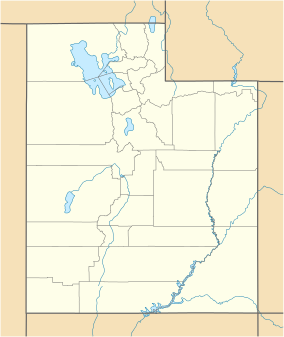Cleveland-Lloyd Dinosaur Quarry
natural protected area in the United States of America
The Cleveland-Lloyd Dinosaur Quarry is well known for having the densest concentration of Jurassic dinosaur fossils ever found. It is a paleontological site near Cleveland, Utah. The quarry is in a part of the geological layers known as the Morrison Formation.
| Cleveland-Lloyd Dinosaur Quarry | |
|---|---|
 Cleveland-Lloyd Dinosaur Quarry Visitor Center | |
Map of Utah | |
| Location | Emery County, Utah |
| Nearest city | Cleveland |
| Coordinates | 39°19′22″N 110°41′22″W / 39.32282°N 110.68951°W |
| Governing body | Bureau of Land Management |
| www | |
| Designated | 1965 |
Well over 15,000 bones have been excavated from this Jurassic excavation site. There are many thousands more awaiting excavation and study. It was designated a National Natural Landmark in October 1965.[1]
All of these bones, belonging to different species, are found disarticulated and mixed together. Perhaps this strong concentration of mixed fossilised bones is due to a "predator trap". No scientific consensus has been reached yet and debates continue to the present day.[2][3]
References
change- ↑ "NPS NNL Page". Archived from the original on 2016-05-24. Retrieved 2018-04-27.
- ↑ Stokes W.L. 1985. The Cleveland-Lloyd Dinosaur Quarry: window to the past. U. S. Government Printing Office. Richmond D.R. and Morris T.H. 1996. The dinosaur death trap of the Cleveland-Lloyd Dinosaur Quarry, Emery County, Utah, in Morales M. ed. The Continental Jurassic: Museum of Northern Arizona Bulletin 60, pp. 533–545.
- ↑ Joseph E. Peterson, Jonathan P. Warnock, Shawn L. Eberhart, Steven R. Clawson & Christopher R. Noto (2017). New data towards the development of a comprehensive taphonomic framework for the Late Jurassic Cleveland-Lloyd Dinosaur Quarry, Central Utah. PeerJ 5:e3368, doi: http://doi.org/10.7717/peerj.3368
